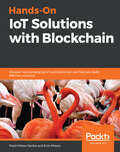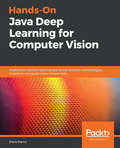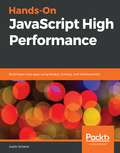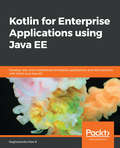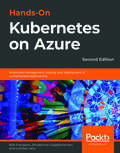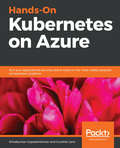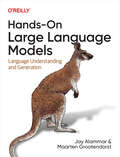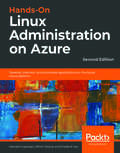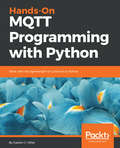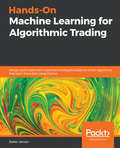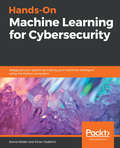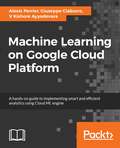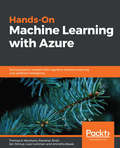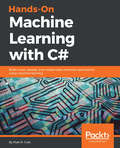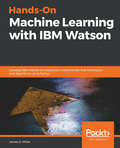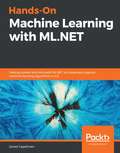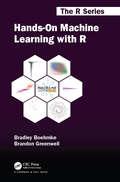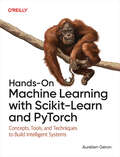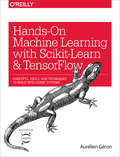- Table View
- List View
Hands-On IoT Solutions with Blockchain: Discover how converging IoT and blockchain can help you build effective solutions
by Enio Moura Maximiliano SantosIntegrate an end-to-end logistic chain using IBM Blockchain and IoT platforms Key Features Explore practical implementation of ledger technology in the IoT architecture Study security best practices for your smart devices Understand Blockchain implementation for end-to-end IoT solutions Book Description Blockchain has been the hot topic of late thanks to cryptocurrencies. To make matters more interesting, the financial market is looking for ways to reduce operational costs and generate new business models, and this is where blockchain solutions come into the picture. In addition to this, with Internet of Things (IoT) trending and Arduino, Raspberry Pi, and other devices flooding the market, you can now create cheap devices even at home. Hands-On IoT Solutions with Blockchain starts with an overview of IoT concepts in the current business scenario. It then helps you develop your own device on the IBM Watson IoT platform and create your fi rst IoT solution using Watson and Intel Edison.Once you are familiar with IoT, you will learn about Blockchain technology and its use cases. You will also work with the Hyperledger framework and develop your own Blockchain network. As you progress through the chapters, you'll work with problem statements and learn how to design your solution architecture so that you can create your own integrated Blockchain and IoT solution. The next set of chapters will explain how to implement end-to-end Blockchain solutions with IoT using the IBM Cloud platform. By the end of this book, you will have mastered the convergence of IoT and Blockchain technology and exploited the best practices and drivers to develop a bulletproof integrated solution. What you will learn Understand the key roles of IoT in the current market Study the different aspects of IBM Watson IoT platform Create devices, gateways, and applications connected to the platform Explore the fundamentals of Blockchain Define good use cases for Blockchain Discover the Hyperledger Fabric and Composer frameworks Develop an IBM Watson IoT application using a Intel Edison Integrate IoT with the Blockchain platform Who this book is for Hands-On IoT Solutions with Blockchain is for you if you are an Internet of Things (IoT) analyst, architect, engineer, or any stakeholder responsible for security mechanisms on an IoT infrastructure. This book is also for IT professionals who want to start developing solutions using Blockchain and IoT on the IBM Cloud platform. Basic understanding of IoT will assist you in understanding key concepts covered in the book.
Hands-On Java Deep Learning for Computer Vision: Implement machine learning and neural network methodologies to perform computer vision-related tasks
by Klevis RamoLeverage the power of Java and deep learning to build production-grade Computer Vision applications Key FeaturesBuild real-world Computer Vision applications using the power of neural networks Implement image classification, object detection, and face recognitionKnow best practices on effectively building and deploying deep learning models in JavaBook DescriptionAlthough machine learning is an exciting world to explore, you may feel confused by all of its theoretical aspects. As a Java developer, you will be used to telling the computer exactly what to do, instead of being shown how data is generated; this causes many developers to struggle to adapt to machine learning.The goal of this book is to walk you through the process of efficiently training machine learning and deep learning models for Computer Vision using the most up-to-date techniques. The book is designed to familiarize you with neural networks, enabling you to train them efficiently, customize existing state-of-the-art architectures, build real-world Java applications, and get great results in a short space of time. You will build real-world Computer Vision applications, ranging from a simple Java handwritten digit recognition model to real-time Java autonomous car driving systems and face recognition models.By the end of this book, you will have mastered the best practices and modern techniques needed to build advanced Computer Vision Java applications and achieve production-grade accuracy.What you will learnDiscover neural networks and their applications in Computer VisionExplore the popular Java frameworks and libraries for deep learningBuild deep neural networks in Java Implement an end-to-end image classification application in JavaPerform real-time video object detection using deep learningEnhance performance and deploy applications for productionWho this book is forThis book is for data scientists, machine learning developers and deep learning practitioners with Java knowledge who want to implement machine learning and deep neural networks in the computer vision domain. You will need to have a basic knowledge of Java programming.
Hands-On JavaScript High Performance: Build faster web apps using Node.js, Svelte.js, and WebAssembly
by Justin SchererAn example-driven guide covering modern web app development techniques and emerging technologies such as WebAssembly, Service Workers, and Svelte.js to build faster, secure, and scalable apps Key Features Discover effective techniques for accessing DOM, minimizing painting, and using a V8 engine to optimize JavaScript Understand what makes the web tick and create apps that look and feel like native desktop applications Explore modern JavaScript frameworks like Svelte.js for building next-gen web apps Book Description High-performance web development is all about cutting through the complexities in different layers of a web app and building services and APIs that improve the speed and performance of your apps on the browser. With emerging web technologies, building scalable websites and sustainable web apps is smoother than ever. This book starts by taking you through the web frontend, popular web development practices, and the latest version of ES and JavaScript. You'll work with Node.js and learn how to build web apps without a framework. The book consists of three hands-on examples that help you understand JavaScript applications at both the server-side and the client-side using Node.js and Svelte.js. Each chapter covers modern techniques such as DOM manipulation and V8 engine optimization to strengthen your understanding of the web. Finally, you'll delve into advanced topics such as CI/CD and how you can harness their capabilities to speed up your web development dramatically. By the end of this web development book, you'll have understood how the JavaScript landscape has evolved, not just for the frontend but also for the backend, and be ready to use new tools and techniques to solve common web problems. What you will learn Explore Vanilla JavaScript for optimizing the DOM, classes, and modules, and querying with jQuery Understand immutable and mutable code and develop faster web apps Delve into Svelte.js and use it to build a complete real-time Todo app Build apps to work offline by caching calls using service workers Write C++ native code and call the WebAssembly module with JavaScript to run it on a browser Implement CircleCI for continuous integration in deploying your web apps Who this book is for This JavaScript book is for web developers, C/C++ programmers, and anyone who wants to build robust web applications using advanced web technologies. This book assumes a good grasp of Vanilla JavaScript and an understanding of web development tools, such as Chrome Developer tools or Mozilla's developer tools.
Hands-On Kotlin for Enterprise Applications using Java EE
by Raghavendra Rao KKotlin for Enterprise Applications using Java EE is for Java EE developers who want to build their enterprise project or application with Kotlin or migrate from Java to Kotlin. Basic knowledge of programming is necessary.
Hands-On Kubernetes on Azure: Automate management, scaling, and deployment of containerized applications, 2nd Edition
by Gunther Lenz Shivakumar Gopalakrishnan Nills FranssensKick-start your DevOps career by learning how to effectively deploy Kubernetes on Azure in an easy, comprehensive, and fun way with hands-on coding tasks Key Features Understand the fundamentals of Docker and Kubernetes Learn to implement microservices architecture using the Kubernetes platform Discover how you can scale your application workloads in Azure Kubernetes Service (AKS) Book Description From managing versioning efficiently to improving security and portability, technologies such as Kubernetes and Docker have greatly helped cloud deployments and application development. Starting with an introduction to Docker, Kubernetes, and Azure Kubernetes Service (AKS), this book will guide you through deploying an AKS cluster in different ways. You'll then explore the Azure portal by deploying a sample guestbook application on AKS and installing complex Kubernetes apps using Helm. With the help of real-world examples, you'll also get to grips with scaling your application and cluster. As you advance, you'll understand how to overcome common challenges in AKS and secure your application with HTTPS and Azure AD (Active Directory). Finally, you'll explore serverless functions such as HTTP triggered Azure functions and queue triggered functions. By the end of this Kubernetes book, you'll be well-versed with the fundamentals of Azure Kubernetes Service and be able to deploy containerized workloads on Microsoft Azure with minimal management overhead. What you will learn Plan, configure, and run containerized applications in production Use Docker to build apps in containers and deploy them on Kubernetes Improve the configuration and deployment of apps on the Azure Cloud Store your container images securely with Azure Container Registry Install complex Kubernetes applications using Helm Integrate Kubernetes with multiple Azure PaaS services, such as databases, Event Hubs and Functions. Who this book is for This book is for aspiring DevOps professionals, system administrators, developers, and site reliability engineers looking to understand test and deployment processes and improve their efficiency. If you're new to working with containers and orchestration, you'll find this book useful.
Hands-On Kubernetes on Azure: Run Your Applications Securely And At Scale On The Most Widely Adopted Orchestration Platform
by Gunther Lenz Shivakumar GopalakrishnanIf you're a cloud engineer, cloud solution provider, sysadmin, site reliability engineer, or a developer interested in DevOps and are looking for an extensive guide to running Kubernetes in the Azure environment then, this book is for you. Though any previous knowledge of Kubernetes is not expected, some experience with Linux and Docker containers would be beneficial.
Hands-On Kubernetes on Windows: Effectively orchestrate Windows container workloads using Kubernetes
by Piotr TylendaBuild and deploy scalable cloud applications using Windows containers and Kubernetes Key Features Run, deploy, and orchestrate containers on the Windows platform with this Kubernetes book Use Microsoft SQL Server 2019 as a data store to deploy Kubernetes applications written in .NET Framework Set up a Kubernetes development environment and deploy clusters with Windows Server 2019 nodes Book Description With the adoption of Windows containers in Kubernetes, you can now fully leverage the flexibility and robustness of the Kubernetes container orchestration system in the Windows ecosystem. This support will enable you to create new Windows applications and migrate existing ones to the cloud-native stack with the same ease as for Linux-oriented cloud applications. This practical guide takes you through the key concepts involved in packaging Windows-distributed applications into containers and orchestrating these using Kubernetes. You'll also understand the current limitations of Windows support in Kubernetes. As you advance, you'll gain hands-on experience deploying a fully functional hybrid Linux/Windows Kubernetes cluster for development, and explore production scenarios in on-premises and cloud environments, such as Microsoft Azure Kubernetes Service. By the end of this book, you'll be well-versed with containerization, microservices architecture, and the critical considerations for running Kubernetes in production environments successfully. What you will learn Understand containerization as a packaging format for applications Create a development environment for Kubernetes on Windows Grasp the key architectural concepts in Kubernetes Discover the current limitations of Kubernetes on the Windows platform Provision and interact with a Kubernetes cluster from a Windows machine Create hybrid Windows Kubernetes clusters in on-premises and cloud environments Who this book is for This book is for software developers, system administrators, DevOps engineers, and architects working with Kubernetes on Windows, Windows Server 2019, and Windows containers. Knowledge of Kubernetes as well as the Linux environment will help you get the most out of this book.
Hands-On Large Language Models: Language Understanding and Generation
by Jay Alammar Maarten GrootendorstAI has acquired startling new language capabilities in just the past few years. Driven by the rapid advances in deep learning, language AI systems are able to write and understand text better than ever before. This trend enables the rise of new features, products, and entire industries. With this book, Python developers will learn the practical tools and concepts they need to use these capabilities today.You'll learn how to use the power of pre-trained large language models for use cases like copywriting and summarization; create semantic search systems that go beyond keyword matching; build systems that classify and cluster text to enable scalable understanding of large amounts of text documents; and use existing libraries and pre-trained models for text classification, search, and clusterings.This book also shows you how to:Build advanced LLM pipelines to cluster text documents and explore the topics they belong toBuild semantic search engines that go beyond keyword search with methods like dense retrieval and rerankersLearn various use cases where these models can provide valueUnderstand the architecture of underlying Transformer models like BERT and GPTGet a deeper understanding of how LLMs are trainedUnderstanding how different methods of fine-tuning optimize LLMs for specific applications (generative model fine-tuning, contrastive fine-tuning, in-context learning, etc.)
Hands-On Linux Administration on Azure: Develop, maintain, and automate applications on the Azure cloud platform, 2nd Edition
by Frederik Vos Kamesh Ganesan Rithin SkariaDevelop a solid understanding of cloud computing, Linux virtual machine, container virtualization, and other fundamental concepts to create and manage your Linux workload in Azure Key Features Deploy and manage virtual machines in the Azure environment Explore open source tools to integrate automation and orchestration Implement Linux features to create and manage containers Book Description Thanks to its flexibility in delivering scalable cloud solutions, Microsoft Azure is a suitable platform for managing all your workloads. You can use it to implement Linux virtual machines and containers, and to create applications in open source languages with open APIs. This Linux administration book first takes you through the fundamentals of Linux and Azure to prepare you for the more advanced Linux features in later chapters. With the help of real-world examples, you'll learn how to deploy virtual machines (VMs) in Azure, expand their capabilities, and manage them efficiently. You will manage containers and use them to run applications reliably, and in the concluding chapter, you'll explore troubleshooting techniques using a variety of open source tools. By the end of this book, you'll be proficient in administering Linux on Azure and leveraging the tools required for deployment. What you will learn Grasp the fundamentals of virtualization and cloud computing Understand file hierarchy and mount new filesystems Maintain the life cycle of your application in Azure Kubernetes Service Manage resources with the Azure CLI and PowerShell Manage users, groups, and filesystem permissions Use Azure Resource Manager to redeploy virtual machines Implement configuration management to configure a VM correctly Build a container using Docker Who this book is for If you are a Linux administrator or a Microsoft professional looking to deploy and manage your workload in Azure, this book is for you. Although not necessary, knowledge of Linux and Azure will assist with understanding core concepts.
Hands-On Linux Administration on Azure: Explore the essential Linux administration skills you need to deploy and manage Azure-based workloads
by Frederik VosLearn to efficiently run Linux-based workloads in AzureKey FeaturesManage and deploy virtual machines in your Azure environmentExplore various open source tools to integrate automation and orchestrationLeverage Linux features to create, run, and manage containersBook DescriptionAzure’s market share has increased massively and enterprises are adopting it rapidly. Linux is a widely-used operating system and has proven to be one of the most popular workloads on Azure. It has become crucial for Linux administrators and Microsoft professionals to be well versed with the concepts of managing Linux workloads in an Azure environment.Hands-On Linux Administration on Azure starts by introducing you to the fundamentals of Linux and Azure, after which you will explore advanced Linux features and see how they are managed in an Azure environment. Next, with the help of real-world scenarios, you will learn how to deploy virtual machines(VMs) in Azure, along with extending Azure VMs capabilities and managing them efficiently. You will then understand continuous configuration automation and use Ansible, SaltStack and Powershell DSC for orchestration. As you make your way through the chapters, you will understand containers and how they work, along with managing containers and the various tasks you can perform with them. In the concluding chapters, you will cover some Linux troubleshooting techniques on Azure, and you will also be able to monitor Linux in Azure using different open source tools.By the end of this book, you will be able to administer Linux on Azure and make the most of the important tools required for deployment.What you will learnUnderstand why Azure is the ideal solution for your open source workloadsMaster essential Linux skills and learn to find your way around the Linux environmentDeploy Linux in an Azure environmentUse configuration management to manage Linux in AzureManage containers in an Azure environmentEnhance Linux security and use Azure’s identity management systemsAutomate deployment with Azure Resource Manager (ARM) and PowershellEmploy Ansible to manage Linux instances in an Azure cloud environmentWho this book is forHands-On Linux Administration on Azure is for Linux administrators and Microsoft professionals that need to deploy and manage their workloads in Azure. Prior knowledge of Linux and Azure isn't necessary.
Hands-On Linux for Architects: Design and implement Linux-based IT solutions
by Denis Salamanca Esteban FloresExplore practical use cases to learn everything from Linux components, and functionalities, through to hardware and software supportKey FeaturesGain a clear understanding of how to design a Linux environmentLearn more about the architecture of the modern Linux operating system(OS)Understand infrastructure needs and design a high-performing computing environmentBook DescriptionIt is very important to understand the flexibility of an infrastructure when designing an efficient environment. In this book, you will cover everything from Linux components and functionalities through to hardware and software support, which will help you to implement and tune effective Linux-based solutions.This book gets started with an overview of Linux design methodology. Next, you will focus on the core concepts of designing a solution. As you progress, you will gain insights into the kinds of decisions you need to make when deploying a high-performance solution using Gluster File System (GlusterFS). In the next set of chapters, the book will guide you through the technique of using Kubernetes as an orchestrator for deploying and managing containerized applications. In addition to this, you will learn how to apply and configure Kubernetes for your NGINX application. You’ll then learn how to implement an ELK stack, which is composed of Elasticsearch, Logstash, and Kibana. In the concluding chapters, you will focus on installing and configuring a Saltstack solution to manage different Linux distributions, and explore a variety of design best practices. By the end of this book, you will be well-versed with designing a high-performing computing environment for complex applications to run on.By the end of the book, you will have delved inside the most detailed technical conditions of designing a solution, and you will have also dissected every aspect in detail in order to implement and tune open source Linux-based solutionsWhat you will learnStudy the basics of infrastructure design and the steps involvedExpand your current design portfolio with Linux-based solutionsDiscover open source software-based solutions to optimize your architectureUnderstand the role of high availability and fault tolerance in a resilient designIdentify the role of containers and how they improve your continuous integration and continuous deployment pipelinesGain insights into optimizing and making resilient and highly available designs by applying industry best practicesWho this book is forThis intermediate-level book is for Linux system administrators, Linux support engineers, DevOps engineers, Linux consultants or any open source technology professional looking to learn or expand their knowledge in architecting, designing and implementing solutions based on Linux and open source software. Prior experience in Linux is required.
Hands-On MQTT Programming with Python: Work with the lightweight IoT protocol in Python
by Gastón C. HillarExplore the features included in the latest versions of MQTT for IoT and M2M communications and use them with modern Python 3.Key FeaturesMake your connected devices less prone to attackers by understanding security mechanismsTake advantage of MQTT features for IoT and Machine-to-Machine communicationsThe only book that covers MQTT with a single language, PythonBook DescriptionMQTT is a lightweight messaging protocol for small sensors and mobile devices. This book explores the features of the latest versions of MQTT for IoT and M2M communications, how to use them with Python 3, and allow you to interact with sensors and actuators using Python.The book begins with the specific vocabulary of MQTT and its working modes, followed by installing a Mosquitto MQTT broker. You will use different utilities and diagrams to understand the most important concepts related to MQTT. You will learn to make all the necessary configuration to work with digital certificates for encrypting all data sent between the MQTT clients and the server. You will also work with the different Quality of Service levels and later analyze and compare their overheads.You will write Python 3.x code to control a vehicle with MQTT messages delivered through encrypted connections (TLS 1.2), and learn how leverage your knowledge of the MQTT protocol to build a solution based on requirements. Towards the end, you will write Python code to use the PubNub cloud-based real-time MQTT provider to monitor a surfing competition.In the end, you will have a solution that was built from scratch by analyzing the requirements and then write Python code that will run on water-proof IoT boards connected to multiple sensors in surfboards.What you will learnLearn how MQTT and its lightweight messaging system workUnderstand the MQTT puzzle: clients, servers (formerly known as brokers), and connectionsExplore the features included in the latest versions of MQTT for IoT and M2M communicationsPublish and receive MQTT messages with PythonLearn the difference between blocking and threaded network loopsTake advantage of the last will and testament featureWork with cloud-based MQTT interfaces in PythonWho this book is forThis book is for developers who want to learn about the MQTT protocol for their IoT projects. Prior knowledge of working with IoT and Python will be helpful.
Hands-On Machine Learning for Algorithmic Trading: Design and implement investment strategies based on smart algorithms that learn from data using Python
by Stefan JansenHands-On Machine Learning for Algorithmic Trading is for data analysts, data scientists, and Python developers, as well as investment analysts and portfolio managers working within the finance and investment industry. If you want to perform efficient algorithmic trading by developing smart investigating strategies using machine learning algorithms, this is the book for you. Some understanding of Python and machine learning techniques is mandatory.
Hands-On Machine Learning for Cybersecurity: Safeguard your system by making your machines intelligent using the Python ecosystem
by Sinan Ozdemir Soma HalderGet into the world of smart data security using machine learning algorithms and Python libraries Key Features Learn machine learning algorithms and cybersecurity fundamentals Automate your daily workflow by applying use cases to many facets of security Implement smart machine learning solutions to detect various cybersecurity problems Book Description Cyber threats today are one of the costliest losses that an organization can face. In this book, we use the most efficient tool to solve the big problems that exist in the cybersecurity domain. The book begins by giving you the basics of ML in cybersecurity using Python and its libraries. You will explore various ML domains (such as time series analysis and ensemble modeling) to get your foundations right. You will implement various examples such as building system to identify malicious URLs, and building a program to detect fraudulent emails and spam. Later, you will learn how to make effective use of K-means algorithm to develop a solution to detect and alert you to any malicious activity in the network. Also learn how to implement biometrics and fingerprint to validate whether the user is a legitimate user or not. Finally, you will see how we change the game with TensorFlow and learn how deep learning is effective for creating models and training systems What you will learn Use machine learning algorithms with complex datasets to implement cybersecurity concepts Implement machine learning algorithms such as clustering, k-means, and Naive Bayes to solve real-world problems Learn to speed up a system using Python libraries with NumPy, Scikit-learn, and CUDA Understand how to combat malware, detect spam, and fight financial fraud to mitigate cyber crimes Use TensorFlow in the cybersecurity domain and implement real-world examples Learn how machine learning and Python can be used in complex cyber issues Who this book is for This book is for the data scientists, machine learning developers, security researchers, and anyone keen to apply machine learning to up-skill computer security. Having some working knowledge of Python and being familiar with the basics of machine learning and cybersecurity fundamentals will help to get the most out of the book
Hands-On Machine Learning on Google Cloud Platform: Implementing smart and efficient analytics using Cloud ML Engine
by Alexis Perrier Giuseppe Ciaburro Kishore AyyadevaraUnleash Google's Cloud Platform to build, train and optimize machine learning modelsKey FeaturesGet well versed in GCP pre-existing services to build your own smart modelsA comprehensive guide covering aspects from data processing, analyzing to building and training ML modelsA practical approach to produce your trained ML models and port them to your mobile for easy accessBook DescriptionGoogle Cloud Machine Learning Engine combines the services of Google Cloud Platform with the power and flexibility of TensorFlow. With this book, you will not only learn to build and train different complexities of machine learning models at scale but also host them in the cloud to make predictions.This book is focused on making the most of the Google Machine Learning Platform for large datasets and complex problems. You will learn from scratch how to create powerful machine learning based applications for a wide variety of problems by leveraging different data services from the Google Cloud Platform. Applications include NLP, Speech to text, Reinforcement learning, Time series, recommender systems, image classification, video content inference and many other. We will implement a wide variety of deep learning use cases and also make extensive use of data related services comprising the Google Cloud Platform ecosystem such as Firebase, Storage APIs, Datalab and so forth. This will enable you to integrate Machine Learning and data processing features into your web and mobile applications.By the end of this book, you will know the main difficulties that you may encounter and get appropriate strategies to overcome these difficulties and build efficient systems.What you will learnUse Google Cloud Platform to build data-based applications for dashboards, web, and mobileCreate, train and optimize deep learning models for various data science problems on big dataLearn how to leverage BigQuery to explore big datasetsUse Google’s pre-trained TensorFlow models for NLP, image, video and much moreCreate models and architectures for Time series, Reinforcement Learning, and generative modelsCreate, evaluate, and optimize TensorFlow and Keras models for a wide range of applicationsWho this book is forThis book is for data scientists, machine learning developers and AI developers who want to learn Google Cloud Platform services to build machine learning applications. Since the interaction with the Google ML platform is mostly done via the command line, the reader is supposed to have some familiarity with the bash shell and Python scripting. Some understanding of machine learning and data science concepts will be handy
Hands-On Machine Learning with Azure: Build powerful models with cognitive machine learning and artificial intelligence
by Jen Stirrup Anindita Basak Thomas K Abraham Parashar Shah Lauri LehmanImplement machine learning, cognitive services, and artificial intelligence solutions by leveraging Azure cloud technologiesKey FeaturesLearn advanced concepts in Azure ML and the Cortana Intelligence Suite architectureExplore ML Server using SQL Server and HDInsight capabilitiesImplement various tools in Azure to build and deploy machine learning modelsBook DescriptionImplementing Machine learning (ML) and Artificial Intelligence (AI) in the cloud had not been possible earlier due to the lack of processing power and storage. However, Azure has created ML and AI services that are easy to implement in the cloud. Hands-On Machine Learning with Azure teaches you how to perform advanced ML projects in the cloud in a cost-effective way.The book begins by covering the benefits of ML and AI in the cloud. You will then explore Microsoft’s Team Data Science Process to establish a repeatable process for successful AI development and implementation. You will also gain an understanding of AI technologies available in Azure and the Cognitive Services APIs to integrate them into bot applications. This book lets you explore prebuilt templates with Azure Machine Learning Studio and build a model using canned algorithms that can be deployed as web services. The book then takes you through a preconfigured series of virtual machines in Azure targeted at AI development scenarios. You will get to grips with the ML Server and its capabilities in SQL and HDInsight. In the concluding chapters, you’ll integrate patterns with other non-AI services in Azure.By the end of this book, you will be fully equipped to implement smart cognitive actions in your models.What you will learnDiscover the benefits of leveraging the cloud for ML and AIUse Cognitive Services APIs to build intelligent botsBuild a model using canned algorithms from Microsoft and deploy it as a web serviceDeploy virtual machines in AI development scenariosApply R, Python, SQL Server, and Spark in AzureBuild and deploy deep learning solutions with CNTK, MMLSpark, and TensorFlowImplement model retraining in IoT, Streaming, and Blockchain solutionsExplore best practices for integrating ML and AI functions with ADLA and logic appsWho this book is forIf you are a data scientist or developer familiar with Azure ML and cognitive services and want to create smart models and make sense of data in the cloud, this book is for you. You’ll also find this book useful if you want to bring powerful machine learning services into your cloud applications. Some experience with data manipulation and processing, using languages like SQL, Python, and R, will aid in understanding the concepts covered in this book
Hands-On Machine Learning with C#: Build smart, speedy, and reliable data-intensive applications using machine learning
by Matt R. ColeExplore supervised and unsupervised learning techniques and add smart features to your applicationsKey FeaturesLeverage machine learning techniques to build real-world applicationsUse the Accord.NET machine learning framework for reinforcement learningImplement machine learning techniques using Accord, nuML, and EncogBook DescriptionThe necessity for machine learning is everywhere, and most production enterprise applications are written in C# using tools such as Visual Studio, SQL Server, and Microsoft Azur2e. Hands-On Machine Learning with C# uniquely blends together an understanding of various machine learning concepts, techniques of machine learning, and various available machine learning tools through which users can add intelligent features.These tools include image and motion detection, Bayes intuition, and deep learning, to C# .NET applications.Using this book, you will learn to implement supervised and unsupervised learning algorithms and will be better equipped to create excellent predictive models. In addition, you will learn both supervised and unsupervised forms of regression, mainly logistic and linear regression, in depth. Next, you will use the nuML machine learning framework to learn how to create a simple decision tree. In the concluding chapters, you will use the Accord.Net machine learning framework to learn sequence recognition of handwritten numbers using dynamic time warping. We will also cover advanced concepts such as artificial neural networks, autoencoders, and reinforcement learning.By the end of this book, you will have developed a machine learning mindset and will be able to leverage C# tools, techniques, and packages to build smart, predictive, and real-world business applications.What you will learnLearn to parameterize a probabilistic problemUse Naive Bayes to visually plot and analyze dataPlot a text-based representation of a decision tree using nuMLUse the Accord.NET machine learning framework for associative rule-based learningDevelop machine learning algorithms utilizing fuzzy logicExplore support vector machines for image recognitionUnderstand dynamic time warping for sequence recognitionWho this book is forHands-On Machine Learning with C#is forC# .NETdevelopers who work on a range of platforms from .NET and Windows to mobile devices. Basic knowledge of statistics is required.
Hands-On Machine Learning with C++: Build, train, and deploy end-to-end machine learning and deep learning pipelines
by Kirill KolodiazhnyiImplement supervised and unsupervised machine learning algorithms using C++ libraries such as PyTorch C++ API, Caffe2, Shogun, Shark-ML, mlpack, and dlib with the help of real-world examples and datasets Key Features Become familiar with data processing, performance measuring, and model selection using various C++ libraries Implement practical machine learning and deep learning techniques to build smart models Deploy machine learning models to work on mobile and embedded devices Book Description C++ can make your machine learning models run faster and more efficiently. This handy guide will help you learn the fundamentals of machine learning (ML), showing you how to use C++ libraries to get the most out of your data. This book makes machine learning with C++ for beginners easy with its example-based approach, demonstrating how to implement supervised and unsupervised ML algorithms through real-world examples. This book will get you hands-on with tuning and optimizing a model for different use cases, assisting you with model selection and the measurement of performance. You'll cover techniques such as product recommendations, ensemble learning, and anomaly detection using modern C++ libraries such as PyTorch C++ API, Caffe2, Shogun, Shark-ML, mlpack, and dlib. Next, you'll explore neural networks and deep learning using examples such as image classification and sentiment analysis, which will help you solve various problems. Later, you'll learn how to handle production and deployment challenges on mobile and cloud platforms, before discovering how to export and import models using the ONNX format. By the end of this C++ book, you will have real-world machine learning and C++ knowledge, as well as the skills to use C++ to build powerful ML systems. What you will learn Explore how to load and preprocess various data types to suitable C++ data structures Employ key machine learning algorithms with various C++ libraries Understand the grid-search approach to find the best parameters for a machine learning model Implement an algorithm for filtering anomalies in user data using Gaussian distribution Improve collaborative filtering to deal with dynamic user preferences Use C++ libraries and APIs to manage model structures and parameters Implement a C++ program to solve image classification tasks with LeNet architecture Who this book is for You will find this C++ machine learning book useful if you want to get started with machine learning algorithms and techniques using the popular C++ language. As well as being a useful first course in machine learning with C++, this book will also appeal to data analysts, data scientists, and machine learning developers who are looking to implement different machine learning models in production using varied datasets and examples. Working knowledge of the C++ programming language is mandatory to get started with this book.
Hands-On Machine Learning with C++: Build, train, and deploy end-to-end machine learning and deep learning pipelines
by Kirill KolodiazhnyiImplement supervised and unsupervised machine learning algorithms using C++ libraries such as PyTorch C++ API, Caffe2, Shogun, Shark-ML, mlpack, and dlib with the help of real-world examples and datasetsKey FeaturesBecome familiar with data processing, performance measuring, and model selection using various C++ librariesImplement practical machine learning and deep learning techniques to build smart modelsDeploy machine learning models to work on mobile and embedded devicesBook DescriptionC++ can make your machine learning models run faster and more efficiently. This handy guide will help you learn the fundamentals of machine learning (ML), showing you how to use C++ libraries to get the most out of your data. This book makes machine learning with C++ for beginners easy with its example-based approach, demonstrating how to implement supervised and unsupervised ML algorithms through real-world examples. This book will get you hands-on with tuning and optimizing a model for different use cases, assisting you with model selection and the measurement of performance. You’ll cover techniques such as product recommendations, ensemble learning, and anomaly detection using modern C++ libraries such as PyTorch C++ API, Caffe2, Shogun, Shark-ML, mlpack, and dlib. Next, you’ll explore neural networks and deep learning using examples such as image classification and sentiment analysis, which will help you solve various problems. Later, you’ll learn how to handle production and deployment challenges on mobile and cloud platforms, before discovering how to export and import models using the ONNX format. By the end of this C++ book, you will have real-world machine learning and C++ knowledge, as well as the skills to use C++ to build powerful ML systems.What you will learnExplore how to load and preprocess various data types to suitable C++ data structuresEmploy key machine learning algorithms with various C++ librariesUnderstand the grid-search approach to find the best parameters for a machine learning modelImplement an algorithm for filtering anomalies in user data using Gaussian distributionImprove collaborative filtering to deal with dynamic user preferencesUse C++ libraries and APIs to manage model structures and parametersImplement a C++ program to solve image classification tasks with LeNet architectureWho this book is forYou will find this C++ machine learning book useful if you want to get started with machine learning algorithms and techniques using the popular C++ language. As well as being a useful first course in machine learning with C++, this book will also appeal to data analysts, data scientists, and machine learning developers who are looking to implement different machine learning models in production using varied datasets and examples. Working knowledge of the C++ programming language is mandatory to get started with this book.
Hands-On Machine Learning with IBM Watson: Leverage IBM Watson to implement machine learning techniques and algorithms using Python
by James MillerThis book is for Data Scientists and Machine Learning Engineers who would like to get introduced to the IBM Cloud and its Machine learning services using practical examples. Basic Python knowledge and limited understanding of Machine Learning will be beneficial.
Hands-On Machine Learning with ML.NET: Getting started with Microsoft ML.NET to implement popular machine learning algorithms in C#
by Jarred CapellmanCreate, train, and evaluate various machine learning models such as regression, classification, and clustering using ML.NET, Entity Framework, and ASP.NET Core Key Features Get well-versed with the ML.NET framework and its components and APIs using practical examples Learn how to build, train, and evaluate popular machine learning algorithms with ML.NET offerings Extend your existing machine learning models by integrating with TensorFlow and other libraries Book Description Machine learning (ML) is widely used in many industries such as science, healthcare, and research and its popularity is only growing. In March 2018, Microsoft introduced ML.NET to help .NET enthusiasts in working with ML. With this book, you'll explore how to build ML.NET applications with the various ML models available using C# code. The book starts by giving you an overview of ML and the types of ML algorithms used, along with covering what ML.NET is and why you need it to build ML apps. You'll then explore the ML.NET framework, its components, and APIs. The book will serve as a practical guide to helping you build smart apps using the ML.NET library. You'll gradually become well versed in how to implement ML algorithms such as regression, classification, and clustering with real-world examples and datasets. Each chapter will cover the practical implementation, showing you how to implement ML within .NET applications. You'll also learn to integrate TensorFlow in ML.NET applications. Later you'll discover how to store the regression model housing price prediction result to the database and display the real-time predicted results from the database on your web application using ASP.NET Core Blazor and SignalR. By the end of this book, you'll have learned how to confidently perform basic to advanced-level machine learning tasks in ML.NET. What you will learn Understand the framework, components, and APIs of ML.NET using C# Develop regression models using ML.NET for employee attrition and file classification Evaluate classification models for sentiment prediction of restaurant reviews Work with clustering models for file type classifications Use anomaly detection to find anomalies in both network traffic and login history Work with ASP.NET Core Blazor to create an ML.NET enabled web application Integrate pre-trained TensorFlow and ONNX models in a WPF ML.NET application for image classification and object detection Who this book is for If you are a .NET developer who wants to implement machine learning models using ML.NET, then this book is for you. This book will also be beneficial for data scientists and machine learning developers who are looking for effective tools to implement various machine learning algorithms. A basic understanding of C# or .NET is mandatory to grasp the concepts covered in this book effectively.
Hands-On Machine Learning with Microsoft Excel 2019: Build complete data analysis flows, from data collection to visualization
by Julio Cesar MartinoA practical guide to getting the most out of Excel, using it for data preparation, applying machine learning models (including cloud services) and understanding the outcome of the data analysis.Key FeaturesUse Microsoft's product Excel to build advanced forecasting models using varied examples Cover range of machine learning tasks such as data mining, data analytics, smart visualization, and more Derive data-driven techniques using Excel plugins and APIs without much code required Book DescriptionWe have made huge progress in teaching computers to perform difficult tasks, especially those that are repetitive and time-consuming for humans. Excel users, of all levels, can feel left behind by this innovation wave. The truth is that a large amount of the work needed to develop and use a machine learning model can be done in Excel.The book starts by giving a general introduction to machine learning, making every concept clear and understandable. Then, it shows every step of a machine learning project, from data collection, reading from different data sources, developing models, and visualizing the results using Excel features and offerings. In every chapter, there are several examples and hands-on exercises that will show the reader how to combine Excel functions, add-ins, and connections to databases and to cloud services to reach the desired goal: building a full data analysis flow. Different machine learning models are shown, tailored to the type of data to be analyzed.At the end of the book, the reader is presented with some advanced use cases using Automated Machine Learning, and artificial neural network, which simplifies the analysis task and represents the future of machine learning.What you will learnUse Excel to preview and cleanse datasetsUnderstand correlations between variables and optimize the input to machine learning modelsUse and evaluate different machine learning models from ExcelUnderstand the use of different visualizationsLearn the basic concepts and calculations to understand how artificial neural networks workLearn how to connect Excel to the Microsoft Azure cloudGet beyond proof of concepts and build fully functional data analysis flowsWho this book is forThis book is for data analysis, machine learning enthusiasts, project managers, and someone who doesn't want to code much for performing core tasks of machine learning. Each example will help you perform end-to-end smart analytics. Working knowledge of Excel is required.
Hands-On Machine Learning with R (Chapman & Hall/CRC The R Series)
by Brad Boehmke Brandon M. GreenwellHands-on Machine Learning with R provides a practical and applied approach to learning and developing intuition into today&’s most popular machine learning methods. This book serves as a practitioner&’s guide to the machine learning process and is meant to help the reader learn to apply the machine learning stack within R, which includes using various R packages such as glmnet, h2o, ranger, xgboost, keras, and others to effectively model and gain insight from their data. The book favors a hands-on approach, providing an intuitive understanding of machine learning concepts through concrete examples and just a little bit of theory. Throughout this book, the reader will be exposed to the entire machine learning process including feature engineering, resampling, hyperparameter tuning, model evaluation, and interpretation. The reader will be exposed to powerful algorithms such as regularized regression, random forests, gradient boosting machines, deep learning, generalized low rank models, and more! By favoring a hands-on approach and using real word data, the reader will gain an intuitive understanding of the architectures and engines that drive these algorithms and packages, understand when and how to tune the various hyperparameters, and be able to interpret model results. By the end of this book, the reader should have a firm grasp of R&’s machine learning stack and be able to implement a systematic approach for producing high quality modeling results. Features: · Offers a practical and applied introduction to the most popular machine learning methods. · Topics covered include feature engineering, resampling, deep learning and more. · Uses a hands-on approach and real world data.
Hands-On Machine Learning with Scikit-Learn and PyTorch: Concepts, Tools, and Techniques to Build Intelligent Systems
by Aurélien GéronThe potential of machine learning today is extraordinary, yet many aspiring developers and tech professionals find themselves daunted by its complexity. Whether you're looking to enhance your skill set and apply machine learning to real-world projects or are simply curious about how AI systems function, this book is your jumping-off place. With an approachable yet deeply informative style, author Aurélien Géron delivers the ultimate introductory guide to machine learning and deep learning. Drawing on the Hugging Face ecosystem, with a focus on clear explanations and real-world examples, the book takes you through cutting-edge tools like Scikit-Learn and PyTorch—from basic regression techniques to advanced neural networks. Whether you're a student, professional, or hobbyist, you'll gain the skills to build intelligent systems. Understand ML basics, including concepts like overfitting and hyperparameter tuning Complete an end-to-end ML project using scikit-Learn, covering everything from data exploration to model evaluation Learn techniques for unsupervised learning, such as clustering and anomaly detection Build advanced architectures like transformers and diffusion models with PyTorch Harness the power of pretrained models—including LLMs—and learn to fine-tune them Train autonomous agents using reinforcement learning
Hands-On Machine Learning with Scikit-Learn and TensorFlow: Concepts, Tools, and Techniques to Build Intelligent Systems
by Aurélien GéronGraphics in this book are printed in black and white.Through a series of recent breakthroughs, deep learning has boosted the entire field of machine learning. Now, even programmers who know close to nothing about this technology can use simple, efficient tools to implement programs capable of learning from data. This practical book shows you how.By using concrete examples, minimal theory, and two production-ready Python frameworks—scikit-learn and TensorFlow—author Aurélien Géron helps you gain an intuitive understanding of the concepts and tools for building intelligent systems. You’ll learn a range of techniques, starting with simple linear regression and progressing to deep neural networks. With exercises in each chapter to help you apply what you’ve learned, all you need is programming experience to get started. Explore the machine learning landscape, particularly neural nets; Use scikit-learn to track an example machine-learning project end-to-end; Explore several training models, including support vector machines, decision trees, random forests, and ensemble methods; Use the Tensor; Flow library to build and train neural nets; Dive into neural net architectures, including convolutional nets, recurrent nets, and deep reinforcement learning; Learn techniques for training and scaling deep neural nets; and apply practical code examples without acquiring excessive machine learning theory or algorithm details.
